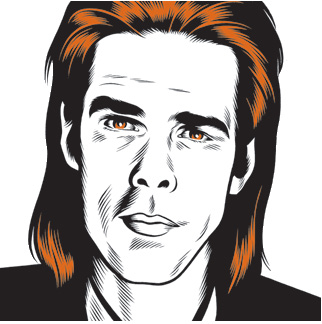Nick Cave is best known as the bandleader for the Bad Seeds and for the Birthday Party. In 2006, after years of composing murder ballads and songs of damnation, a few of his bandmates formed Grinderman, a stripped-down garage-rock version of the Bad Seeds, with Nick singing and playing guitar. Fans and critics who thought he was destined for residency on the Vegas strip got the wind knocked out of them.
Cave, now fifty-one, stopped using heroin several years ago. Occasional rehab and some time in jail over the years didn’t stop his continued usage. He doesn’t condemn heroin or drug use, but he did say that it was interfering with his creativity and that’s why he finally stopped. Now, during those slow days before turning on the juice to become Nick Cave the performer, he can concentrate less on his next fix and more on writing, both screenplays and fiction. A recent screenplay, The Proposition, was directed by John Hillcoat, and Cave has just finished his second novel, The Death of Bunny Munro. Originally a script for Hillcoat, Bunny Munro was put on permanent hold when the director began work on an adaptation of Cormac McCarthy’s The Road, which Cave scored. Instead of letting it sit, Cave adapted the script into a novel about a sex-obsessed door-to-door salesman.
You have reached your article limit
Sign up for a digital subscription and continue reading all new issues, plus our entire archives, for just $1.50/month.
Already a subscriber? Sign in





